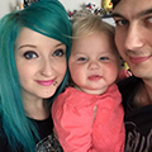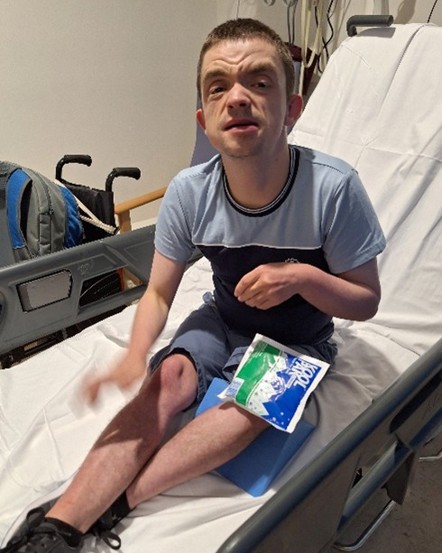World Cerebral Palsy Day 2017

Ceri-Ann Brown
My name is Ceri-Ann Brown and I live in Stockport, Manchester. I live with the love of my life Phil, my amazing daughter (Amy-Rose) and my giant guine...
October the 6th is world cerebral palsy day... a day to acknowledge, appreciate, celebrate, and most importantly raise awareness for this neurological condition.
We are almost 4 years into our deep relationship with the world of cerebral palsy and I still have so much to learn.
When we were first given Amy's diagnosis at 10 months I was told "Amy is a little girl who will have significant mobility issues"... all of the words spoken that day still churn around in my head every night as I try to get to sleep.I try to think of how else it could have been phrased... if I would prefer the news be delivered in a different way. The answer really is no.
There is no easy way to hear that your child is going to be drastically different from the one you first envisaged when you saw your first pregnancy scan.
It takes a long time to digest and process information like this, I think in a lot of ways I am still learning, and re-learning.
I thought I'd use this post as an opportunity to share with you some of the things I have learned about cerebral palsy.
I think it'd be cool if everyone could leave some comments about what they have learned on their journey too.
1. First and foremost. If you have met a child with cerebral palsy you have done just that. You have met ONE child with cerebral palsy.
CP manifests itself in all sorts of different ways. Just because your neighbours' friend's cousin has CP and can walk does not mean that my child will also learn to walk.What makes all of us different makes us beautiful and each person with cerebral palsy is just like everyone else... we all have different challenges, hobbies, abilities and so on.
2. Not enough people understand what cerebral palsy is. A lot of people who meet us don't really understand what it means... before Amy I also didn't really understand what it means.
My favourite way to explain it to people is that the brain controls the muscles differently and that this can affect speech, learning, posture, movement and so on.
I think the key to acceptance and inclusion is understanding. I really wish that we were taught from a young age to embrace difference and to continue with that ethos in to later life.
3. Cerebral palsy can be acquired in different ways. For us it was hypoxic ischemic encephalopathy. Amy was born starved of oxygen from aspirating meconium.
HIE can happen from things such as placental abruptions, cord compression or entanglement, all sorts. In some cases it is preventable, or in our case... inevitable.
I have since met people who had a brain bleed, a stroke, fluid on the brain and so on.
There is no one way cerebral palsy happens, it can happen to anyone. It is not contagious, it is not to be feared.
4. My daughter is not "wheelchair bound". I have said this before and I will say it again... her wheelchair is her freedom and her access.Of course I would (and she probably would too) love her to be able to move independently, but it is what it is, so the best thing to do is make sure you access the community the best you can and have the sweetest wheels in town.
So many people feel negatively about disability and they pity her.
My main sadness for Amy is the pain she often feels from muscle spasms or feeding issues... but when it comes to her wheelchair and feeding pump I am grateful that these technologies exist to keep her alive and give her a way to explore the world around her.5. Standing frames are not so your child can learn to stand! I did at one point think this. I realise now this was a bit naive and over hopeful!
It is to help with bone density, muscle building, weight bearing, postural support, aids motility/digestion and all sorts.
Learning about all of the different pieces of equipment and their purpose has been a huge deal for us. There is so much more to physio than helping someone become mobile.
It's about preventing hip and back issues, protecting bones and muscles and so on.
6. I like to raise awareness! I love when people get the confidence to ask questions and learn.
A lot of people may stare... or go the opposite way and look away from us, but we love when people either just interact with Amy like they would any other child... or they satisfy their curiosities and go away knowing more about the different people that surround them.Everyday seems to feel like a learning curve. Amy is due her first orthopaedics appointment soon. This is an appointment I have been anticipating for a while.
I wonder if her dystonia has worsened her hips, I wonder if her spasticity could be better managed than it currently is, I wonder if her physio interventions we do at home are enough, I wonder if the ankle foot orthotics are sufficiently helping her legs and feet.
There is so much left to learn.
I have dedicated a long time to just trying to understand tube feeding and the various ways we can help Amy increase her weight and receive ample nutrition; I have also spent a lot of time looking into different ways to help her communicate.


